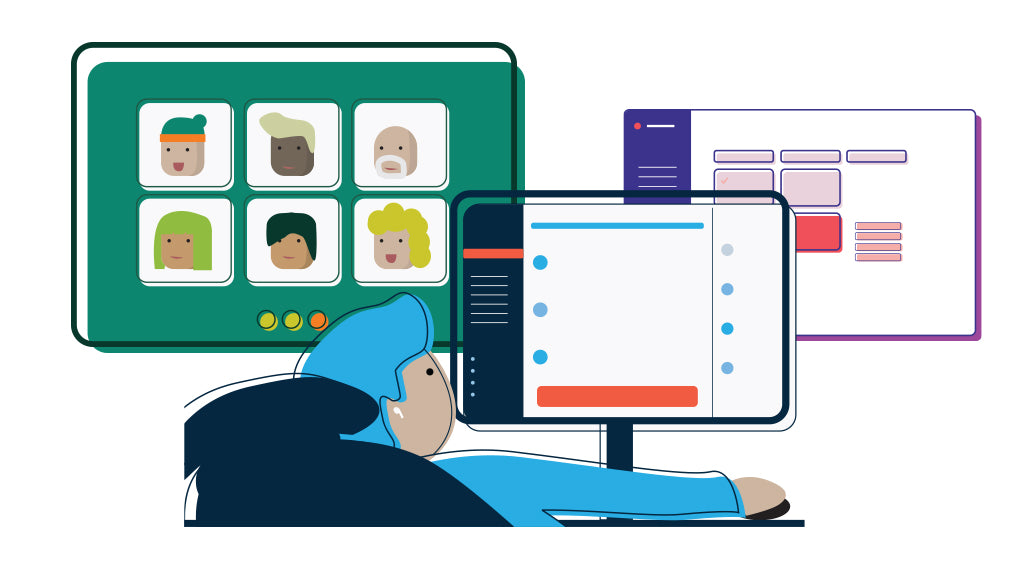
As we all shift our behaviours and embrace social distancing measures in the wake of the COVID-19 pandemic, many of us have found ourselves working from home for the first time. Such arrangements can be challenging at the best of times as people transition into new work environments. However, with the addition of health and economic concerns, and as is generally the case with global disasters, people are more than a little on edge. That is why, here at Orbitkey, we want to share our tips for working at home with you – to make social distancing a little more social, and keep us all a little more connected.
Challenges
If you have the luxury of working from home in these current times, thank your lucky stars. But let’s be clear, there can be a sharp divide between the alluring idea of working from home, and the actual reality of doing it. That is because working from home requires effort, planning and organisation. A lot of organisation. Perhaps more so than when you’re at the office. Working from home will often require us to work in a space that was designed for family engagement, recreation or rest. It will often lack the structure of traditional work environments and this can in turn create a sense of isolation and loneliness. But it doesn’t have to. We believe that even small changes can make all the difference when it comes to organisation and working from home. So, let’s get to it!
Solutions

1. Create a workstation – just for you
If you have the ability to create a dedicated workstation, away from other people and distractions, please do. You will thank yourself for it. Obviously, we all have different constraints in this area, but if you can set yourself up with a functional, aesthetically pleasing space, you will be better positioned to focus on your tasks. Try to avoid sitting directly next to your flatmate or partner, especially if they will be taking calls or using video chat platforms. Try to face a window with some natural light, rather than a blank wall (or a television screen). If you need to borrow an office chair or a monitor, ask your employer. If you can get access to some plants and a desk lamp, even better.
And no, you can’t work from that beautiful park opposite your apartment, or your favourite roastery café down the street – current circumstances don’t permit it, so don’t ask!
If you’re struggling to organise your workspace, check out Orbitkey Nest – our newest customisable desk organiser with an in-built wireless charger. You’re welcome.

2. Replace your commute time with mental prep time
We all have limited mental bandwidth, and disorganisation and poor planning can eat away at that bandwidth. That’s why we would encourage people to develop an enjoyable morning routine that allows you to properly transition from your home life into your work life – before you sit down at your computer. Make a tea, stretch, prep lunch, make a second tea – go crazy (well, not literally) – get dressed and get ready for your day. Yes, this means no working from bed and no working sans pants. Pants remain critical.
3. Create some office ground rules
Try to diplomatically set out some ground rules for any people you might be sharing your space with. This is key. Just as your flatmate wouldn’t walk in unannounced into the main conference room on the second floor of your actual office space and interrupt you while you were in a meeting with the head of marketing, you probably don’t want that happening in your home office either. We’d suggest using non-verbal cues to create a ‘do not disturb’, or a ‘in the zone’ status by sticking a red or yellow card on the wall, wearing headphones or closing a door – if you have a door.

You’re likely going to need a solid IT set up including at least one office computer, good wi-fi and all the requisite organisational apps. We use Slack for office communication, Asana for project management, and Google suite as our go-to productivity and collaboration tools – but you do you. The important thing is to make sure you have everything you need to stay connected with your team and to contribute to results. You will likely have to be your own IT support, at least in part. Try to check your wi-fi before you sit down for your first video chat on Monday. If your neighbour upstairs feels the need to listen to talk back radio at full volume constantly, your office tech will include earplugs – trust us here.

One of the biggest challenges of working from home is staying connected with your colleagues, clients and potential account holders. Find a colleague you can chat to if you’re feeling disconnected from your work or your team. If you don’t have a colleague to chat with, perhaps you know someone else who is working from home in a similar industry or role? If you’re feeling worried about your productivity or performance, schedule a meeting and ask for feedback from your team so you can improve. This whole process of remaining connected requires mental effort. Don’t be afraid to speak up on a conference call, even if you don’t have a perfect solution to offer. Sometimes just engaging in the discourse is enough.
6. Managing productivity
This can be a hard one. I think we’ve all had days when we have achieved less (and sometimes a lot less) while working from home than we would have otherwise expected. Navigating this space can definitely be difficult. There are many challenges to manage and overcome when working from home, many of which have already been mentioned. When working from home you have to be able to project-manage yourself. This might mean planning your week out on a Sunday night, or making a daily plan each night for the following day. Use to-do-lists to break complex projects down into smaller, more manageable tasks. In order to maintain a sense of accomplishment, make sure to cross off tasks as you complete them. Communicate wins – even small wins – to your team. If you have downtime, learn about other areas of the business. Actively monitor your mindset and try to stay focused on what you’re grateful for.
Ok, fam that’s it for now. We’re all in this together and we’ve really got to support each other, our fellow business partners, customers, supporters and the wider community as much as we can. Stay awesome. Stay organised. Peace!
If you would like to see more, stay up to date by subscribing to our newsletter below.
















